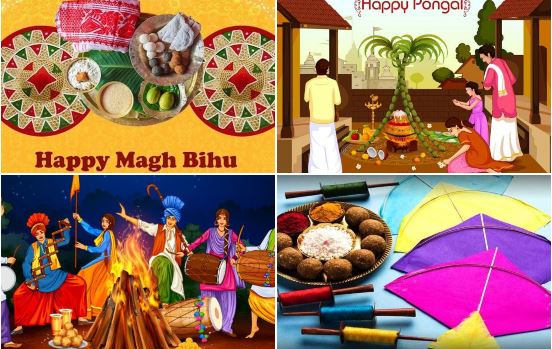There have always been many different cultural identities in India. Every culture has its own festivals that have a significant cultural impact. A few of these festivals, including Magh Bihu, Lohri, Makar Sankranti and Pongal are observed in January. They each have a unique past and importance. The Indian holiday of Lohri is very important historically. People gather around a campfire to pray and rejoice the day before Makar Sankranti. The holiday is largely energetically and joyously observed in Northern India. Lohri is also known as the harvest festival, during which farmers mark the conclusion of the planting season and enjoy folk music.
The holiday is observed in almost every state under a distinct name.
Magha Bihu is observed in Assam, Til Sankranti in Bihar, Pongal in Tamil Nadu, Makara Vilakku in Kerala, Vasi Uttarayan in Gujarat, and Pousha Sankranti in the Northeast.
It is referred to as Lohri in Punjab and Haryana and as Khichdi in Uttar Pradesh.
Magha Bihu is observed in Assam, Til Sankranti in Bihar, Pongal in Tamil Nadu, Makara Vilakku in Kerala, Vasi Uttarayan in Gujarat, and Pousha Sankranti in the Northeast.
Assam
In Assam, when the annual harvest begins, people celebrate Magh Bihu. They also celebrate Rongali Bihu to mark the beginning of the Assamese new year and the end of the harvest season.
It is thought that the event began when residents of the valley began cultivating the soil. The Bihu is thought to be as ancient as the Brahmaputra river.
The highlight of this festival is the food, which is made from the abundance of grains after the harvest. The night before ‘Bhogali Bihu’, which falls on January 15, is called ‘Uruka’ meaning the night of feasts. The villagers make bamboo huts called ‘Bhelaghor’ or community kitchens where they begin with the preparations for the festival.
Various dishes made of vegetables, meat and sweets such as Pitha and Laru are made out of sesame, molasses (black syrup from sugarcane) and coconut to celebrate the famous festival.
The celebrations for the biggest post-harvest festival begin with men erecting mejis (bonfire) and bhelaghars from bamboo, leaves, and thatch.
Punjab and Haryana
Especially among the Hindu and Sikh communities, the people of Haryana and Punjab celebrate the auspicious holiday of Lohri with tremendous fanfare. Lohri, often referred to as Lohadi or Lal Loi, occurs the day before Makar Sankranti. On this day, people create a fire outside of their houses or in public areas using wood and cow dung cakes, and then they perform Parikrama around the fire while offering sesame seeds, jaggery, gajak, rewdi, and peanuts. Additionally, they gather the crops and sacrifice the ‘bhog’ they prepared from them to the fire.
Lohri is a unique event that celebrates the planting and reaping of crops. Because the nights become shorter and the days get longer following Makar Sankranti, a day after Lohri, it also marks the beginning of warmer weather. The bonfire that is lighted during this festival’s festivities symbolises the same concept.
Legends of Dulla Bhatti, a legendary hero who led a revolt against the Mughal Empire, are mentioned in Punjabi folklore. He became prominent in Punjab and as a result of his courage, his name is virtually always included in Lohri songs.
North India
Makar Sankranti, commonly referred to as Maghi, is a Hindu festival that is fervently and devotedly observed throughout India in a variety of cultural contexts. It is customary to commemorate the event, which ushers in longer days, during the second week of January.
According to tradition, Sankranti was a goddess who slew Sankarasur, a demon. Bhisma Pitamah is thought to have passed away on Uttarayan as well. With the winter solstice and the beginning of longer days, Makar Sankranti signifies the end of winter. Different regions of the country have different names for them.
Tamil Nadu and across southern India
Pongal follows Makar Sankranti in the calendar. India celebrates Pongal, a four-day harvest celebration that is tied to the custom of crop harvesting. This celebration often takes place in January, around the time that crops like rice, turmeric, and sugarcane are harvested. In Tamil Nadu, the event is extensively observed. Pongal will be observed from January 15 to January 18 this year.
Pongal has a history that spans back over 2000 years. It has been a Dravidian harvest festival that was observed as Thai Un and Thai Niradal in its early years.
A legend claims that Lord Shiva once instructed his bull, Basava, to travel to the earth and command people to have oil baths and massages daily and to eat once a month. Basava misheard and mistakenly told the people that Shiva had commanded everyone to eat every day and take an oil bath once a month. Shiva, furiously, condemned Bavasa to eternity on earth. To assist people in growing more food, he would have to plough the fields. As a result, this day is related to cattle.





